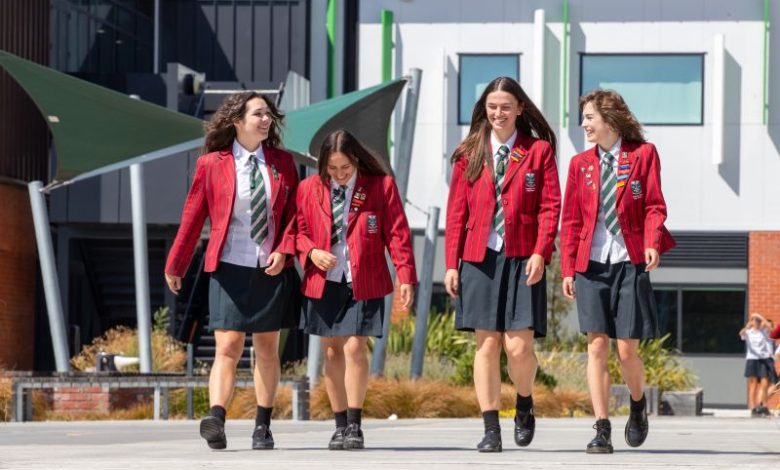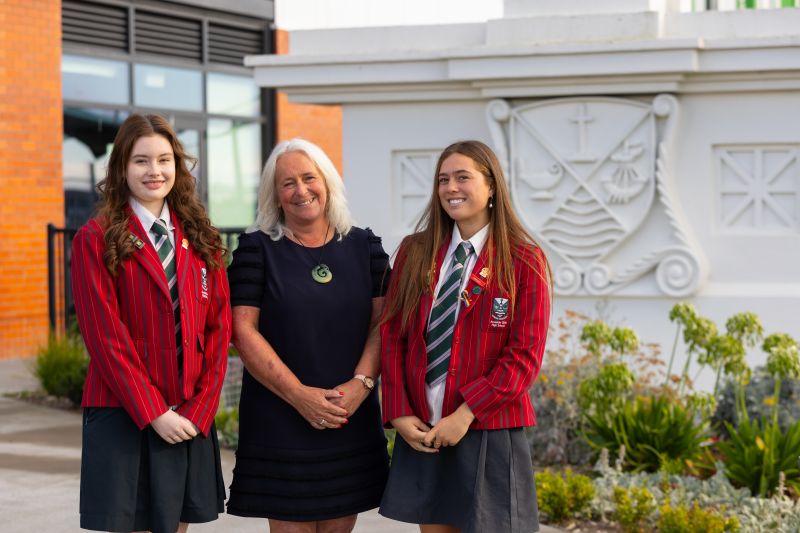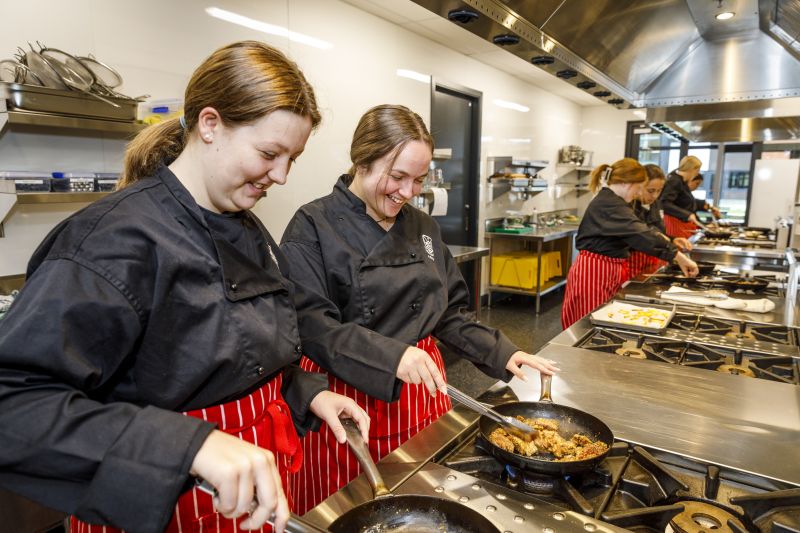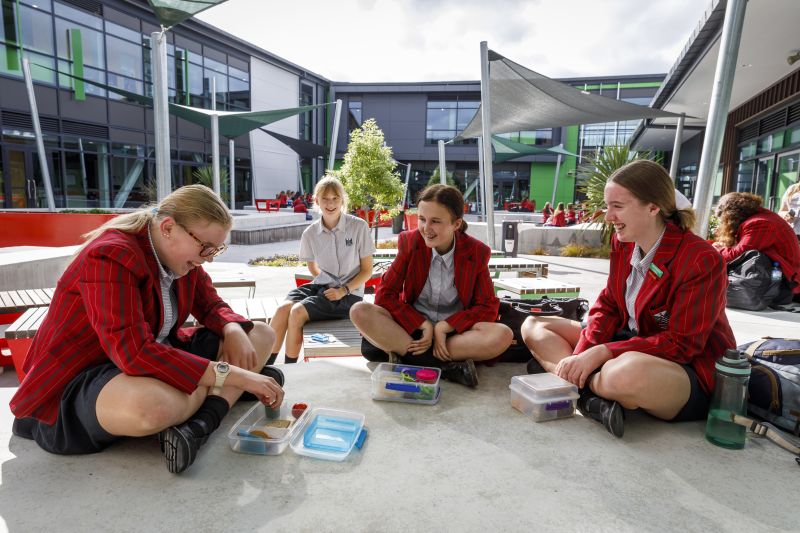
A large secondary school in Christchurch, Avonside Girls’ has almost a hundred years of history. In that time, the school has seen some necessary fresh starts.
Read the latest print edition of School News HERE
A long history
Beginning as another campus for the Christchurch Girls’ High School, Avonside became an independent school in 1927. It quickly developed a reputation as both an academic and sporting school.
In 1965 there was a 25-year period of integration with Te Wai Pounamu Māori Girls’ College. Numbers swelled and there were blocks added throughout the decades. In the 1990s the main blocks underwent significant renovations and classes were held in temporary classrooms onsite until completion of works.
However, in February 2011 the Canterbury earthquakes rendered the school buildings irreparably damaged. In the immediate aftermath, students were accommodated at Burnside resulting in busloads of students being transported across the city, with classes for the cohort operating on a modified schedule from 1:00 pm to 5:25 pm.
In 2012 temporary buildings were erected on the Avonside site where classes were held for more than seven years. During that time, a new building co-located with Shirley Boy’s High was built on a new site. In 2019 the two schools made history as the first two independently run schools to share a property. Key facilities were given shared use, but the two schools operate independently.
“I liken it to someone ripping up an old oak tree with all the roots, taking all of them and then plunking the oak tree down somewhere else… the roots need to be re-established,” said Principal Catherine Law.
Of course, the situation wasn’t helped by the COVID-19 pandemic, which hindered the re-establishment of the school. After what she describes as a “rough few years” for Avonside, Catherine Law was appointed to the Principalship. Law says that it didn’t take her long to recognise what had happened to the school’s culture.
“Within a term it struck me… we didn’t really have a sense of identity because our identity had shifted. Who were we, and who are we? I thought of the whakataukī about looking backward to go forward. We needed to know our history, and we needed to know who we were. But we also needed to do some work on who we are now, and what that looks like.”
Identity and community
“What does Belonging mean at Avonside Girls’ – who were we, who are we and who will we be?” So reads part of Avonside Girls’ strategic plan for 2022 – 25.
The plan outlines three goals:
- “Develop our curriculum and assessment programmes to ensure increased ākonga engagement and achievement and improve learning outcomes for all ākonga.
- Increase ākonga engagement and wellbeing through a relational focused restorative culture and mentoring.
- Build staff capability to collect, track and use data to raise achievement, engagement and inform differentiated pedagogy.”
These goals align with Law’s own personal beliefs based on experience: those who are encouraged to achieve excellence will do so. But how should we define excellence, and what does the community need to achieve it? That begins with identity, says Law.
“We spent two years working with our community, building relationships and trust. We developed a new poutama of values with our community and students… a whole sense of identity of what being at Avonside means and the pride and values that go with that.”
Law says this work has revitalised the relationship between the community and the school, particularly as the school becomes more multicultural. Law says she wanted to ensure that all parents felt welcomed and connected with the school, including Pasifika and Māori families. In turn, the school would be able to understand how they could better serve their whānau.

The questions Avonside Girls’ sought to address included how they could best engage their students and community.
“We needed to market outward to say: ‘Who are we? This is who we are.’ And we’re proud of our girls and their achievements. [So] we built up Polyfest, we built up kapa haka and we put them into our school day. We built up sport and we’re putting that investment into the arts so that it’s a way to breathe life into all those other opportunities as well.
“It comes down to a clarity of identity. Who are you as a school and what are your values? That clarity of identity creates clarity of vision.”
Equity and excellence
Law describes equity as an increasingly important value to the school as they embrace the multicultural nature of the community they serve. The school is now 30 percent Māori and 10 percent Pasifika. The school recognises the cultural needs of their student population, and strives to empower all students with equitable access to education.
“Equity has been really important for us; we have put Te Tiriti O Waitangi at the heart of our charter. It’s equity of academic achievement opportunities and tikanga in the school, all of those things, so that our students—especially those that come from kura kaupapa—feel more at home here and ready to learn.”
Law describes equity as a value that drives her. New Zealand has an inequitable education system, says Law, where the right to education is falling between class lines.
“I think every young person in our country — Māori, Pasifika, Pākehā, female, male, LGBTQIA+ — deserves access to the best education.
“My biggest message is that all our young people here deserve access to the same education and the same knowledge as if they were paying for it at another school; so we measure ourselves against girls’ schools in New Zealand. We should be aiming for that same academic success, sporting success, music, cultural arts success as any of those schools.
“We should be providing excellence,” said Law. Although some young people may come to Avonside Girls’ “without some of the privileges of other young people in our country,” Law is determined not to give up.
“We have to work harder to add the value that they need… if we give them the tools and the access to knowledge, the access to sport, music, arts—that gives young people pathways.”
One crucial element of “teaching success” is pastoral, said Law. Recently, Avonside Girls’ has prioritised tracking students and ensuring each has access to mentorship and support. Law said that some of their young people don’t have family members or older figures to perform this role, so school leadership strives to ensure “we sit with them and that we talk about excellence and merit. We don’t talk to them about ‘achieved’. We talk about aiming for those top grades, talk belief into them all the time.”
One system is the implementation of a small “Ako” group and the development of house cultures. Celebrating success is key, said Law.

Leadership through adversity
“It’s been incredibly important to us that our students lead what we do. We’ve changed our whole leadership model.”
These changes include the way students are selected for leadership. Now, students elect leaders, and more importantly student voice is championed during key decision making. Student leaders are consulted in developing school values, and groups of students will present proposals and report on school culture at board meetings.
Enabling greater student voice can sometimes be confronting, as when student leaders conducted a survey about sexual violence at Avonside Girls’ in 2022. That survey uncovered a pervasive culture of sexual violence with many of their students experiencing sexual harassment. Law describes the students leading the inquiry as “brave” and “really courageous”.
Additional instances of student leadership positively impacting the school include a presentation on the impacts of streaming. There was also a Pasifika student group who spoke about having to walk in two worlds.
“You could’ve heard a pin drop,” said Law. “It was very emotional, and it was very vulnerable and very brave of the students.
“The staff were amazing and responded really well and took away a lot from that: things like thinking about the way they’re talking about when an assessment is due, or supporting a young person around getting their homework done.”
Law also talks about a uniform proposal that was brought to the senior leadership team.
“It was one of the best proposals I’ve ever seen—it was really mature, really thought through. That stuck out to me… they’re so mature, they’re so able to lead.”
“The more we give [students] voice, and the more we give them leadership, the more successful the school has become.”

Outcomes, present and future
Some of the positive outcomes from recent years’ changes in approach to leadership and culture are reflected in school statistics like attendance, and participation in sport and cultural events. There’s also been an improvement in academic results, especially at merit endorsement in NCEA for Māori and Pasifika students, as well as for the whole school.
But aside from the quantitative outcomes, there’s also been several qualitative shifts at Avonside Girls’: positive changes to the atmosphere and morale.
“I see staff and students speaking te reo Māori to each other, I see students talking away and greeting the staff, et cetera. There’s a lot more buoyancy in the school. I see students keen to lead things, keen to step up. They’ll email me and say: ‘we’ve got this idea, can we do this?’ There’s a lot more of that courage. I see our students much more involved in the community, getting involved in all sorts of environmental, other community type activities as well,” said Law.
“There’s been a significant number of parents coming in for school events, prize givings, coming to see teachers and being in touch. That real connection with our community has significantly improved.
“There’s a completely different spirit, wairua, in the school.”









